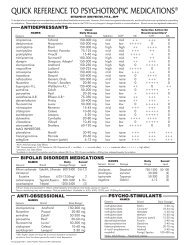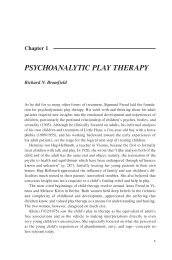IRAQ WAR CLINICIAN GUIDE
Iraq War Clinician's Guide - Network Of Care
Iraq War Clinician's Guide - Network Of Care
Create successful ePaper yourself
Turn your PDF publications into a flip-book with our unique Google optimized e-Paper software.
Iraq War Clinician Guide<br />
P<br />
101 Appendix C<br />
-<br />
IL 10-2004-001<br />
lrebruary 6,2004<br />
ordering of additional tests. Alternately, informatio~i provided as a result of the reminder may be<br />
sufficient to resolvc it. This is the case for the Afgllanistan and lraq clinical reminder, which<br />
only involves specific screening questions. However, positive responses to these questions<br />
might direct the Ihealth care provider lo perform a more extensive clinical evaluation or, in some<br />
cases, to order additional diagnostic tests.<br />
(2) For the Afghanistan nnd lraq clinical reminder, all qucstions in thc reminder have to bc<br />
answered before it is resolved. The questions in this reminder address long-tern1 medical and<br />
psychological health risks among veterans of recent conflicts in Arghanistan and Iraq.<br />
Reminders are programmed so that when they are resolved, specific infonnation from Ule<br />
~lninderis automatically downloaded into a progress note.<br />
d. Actitsation. The "Afghan & Iraq Post-Deployment Screen" was released on Ianuaty 26,<br />
2004, and needs to be installed in CPRS VA-wide by the end of Februa~y 2004. This<br />
modification ofCPRS will enable VHA treatment facilities to reliably identify vetems ofthe<br />
recent conflicts in Afghanistan and lraqnnd provide targeted health care.<br />
e. Screening Questions. Veterans ofreccnt military conflictsare bcingaskcd spcciflcally<br />
about chronic, debilitating symptoms because thcse complaints were a major health problem for<br />
somevctcrans afler the last Gulf War in 1991.<br />
(1) The "Afghan &Iraq Post-Deployment Screen" begins with an inlroductoty explanation<br />
and screening question to confirm the veteran's status as a participant oithe recent conflicts in<br />
Southwest Asia (sce Att A).<br />
(2) The reminder then screcns for risk factors associated with the developmeiit of PTSD (see<br />
AH. B).<br />
(3) The reminder next screens for risk factors associated with the dcvclopment of dcprcssion<br />
(see Att. C).<br />
(4) The reminder next screens for risk factors associated with the developnlent ofalcohol<br />
abusc (scc An. D).<br />
(5) Finally, this clinical reminder scrrens for infectious diseases endemic to Soutl~west Asia<br />
and for chronic symptoms. This health problem is being fargeted in this clinical reminder<br />
because infectious diseases, principally cnteric infcctions, malaria, and leishmaniasis, can present<br />
afler a veteran rctums to the United States and even after separation from active duty. NOTE:<br />
More infortnation aborrl rcle~unr itfecliou diseases can be ohtaitlrd in tlrc VA Vetera~ts Hea/tl~<br />
Iniliatil~e teaching tt~od~rle, "Et~deinic bfecIiulrs Diseases rfSnatlil~rst A.sia "fiu~d 01<br />
l11111:/hv~t~w?va.~~~~~ul~iL<br />
. . -, .---<br />
DEPARTMEhT OF VETERANS AFFAIRS<br />
-<br />
NATIONAL CENTER FOR PTSV




